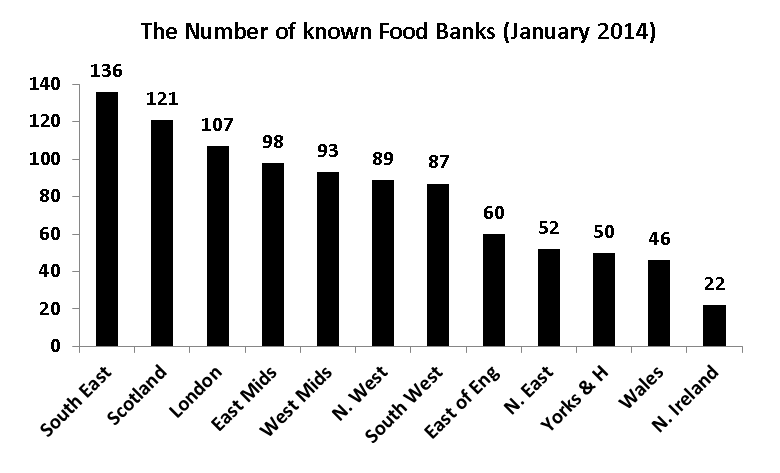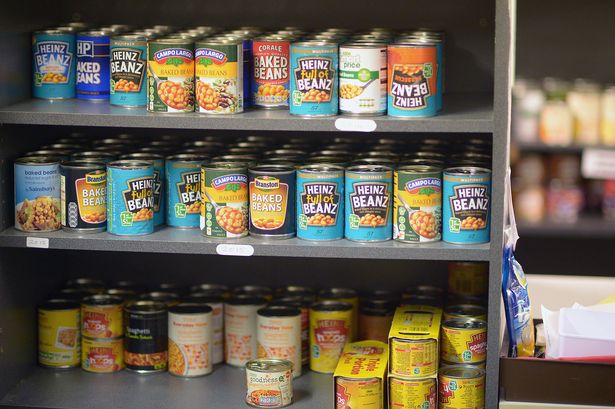Following the 2009 recession, and in the midst of the so-called “cost of living crisis”, media interest in food banks has exploded. These are charitable organisations that provide basic supplies for people who cannot afford even the most basic of goods. Food is donated by the public, and the food banks give this directly to people (they also supply other charitable organisations, like soup kitchens). Whilst nearly unheard of in the UK before 2007, there are now hundreds around the country.

On the face of it, two immediate conclusions can be drawn about food banks. It is a shame that conditions have necessitated them. It is also fantastic that they do exist, given the circumstances. Bizarrely, however, this has not sheltered them from a cacophony of confused criticism.
To an extent, everyone can lament the fact that people are poor enough to require this sort of assistance. Despite left wing caricatures of libertarians, I, for one, do not think poverty is a good thing. Whilst we are not perturbed by inequality, we are concerned with absolute poverty. We differ from the left in terms of solutions, not ends. Take the minimum wage debate - the left highlight raised living standards, the right highlight the risk of increased unemployment. But both sides think their perspective is the one best suited for lifting people from poverty.
Food banks should, then, be a good point for left and right to agree on. Local, community based initiatives to help people in need through voluntary means appears to be the best of left and right combined: caring for the vulnerable, without imposing costs on others or employing a grandiose scheme to forcibly restructure society. And, certainly, many on the left and the right have been positive about the projects.
However, many have not. Some on the right insist upon attacking food bank customers. Some have labelled them a dependency trap. Others have said those who use them have only themselves to blame. This may be true for some individuals. But, if there were only one person who genuinely needed assistance through no fault of their own, this would still justify the existence of food banks.
Unlike the welfare state, food banks are run voluntarily. Neither the contributions of food, nor the incentives for staff, rely on coercion. The cost is imposed only on those who wish to contribute. As such, traditional right wing concerns about welfare do not need to apply here. It is true that in the long-run it would be better if no one required charity and could be entirely self-sufficient. But, at present, some people do require assistance. Being nasty is pointless and counter productive.
What about critics from the left? These fall into two categories. Some have argued that food banks deal with the symptoms but not the causes of poverty. Others actually dislike the charitable nature of food banks, saying that having to get help is humiliating. Both points contain some truth, but are ultimately facile arguments.*
It is true that charity does not address the root of the problem. But, so what? No one ever claimed it did. It may “only” be treating the symptoms, but it is still treating the symptoms. The fact is, poverty exists. It may be true that there is a long-run solution that will deal with the underlying structural or economic reasons behind it*. In the here-and-now term, directly providing for people’s needs and combatting the harshest and most immediate symptoms is what matters most.

In fairness, very few people would actively attack the food banks themselves for this reason. Nor does anyone (as far as I know) say that treating poverty, even with “sticking plasters”, is a bad thing. However, far too often, critics do suggest that food banks, more than being insufficient, are part of the problem. For this breed of critic, the supposed complacency that charity can generate offsets the benefits that charity brings, thus making its existence a net-bad. This is not always said explicitly, but it underpins this sort of argument.
In any case, it is quite a disturbing perspective. Taken to a logical conclusion, this argument could justify leaving people to starve because it would highlight the wider problem of poverty and, thereby, in the long-run contribute to more people being lifted out of poverty in a “meaningful” way. Asides from inconsistency (very few of these pundits would oppose the welfare state on similar grounds), and the obvious issue of uncertainty (what if you went down this root and also failed to enact deeper change?), this is, simply, an unpleasant stance.
It is also true, to an extent, that asking for help “cap in hand” can feel undignified. But what is the alternative? Some on the left suggest that more generous welfare provision would remove the need for “humiliating” charity. This is a weird, but strikingly prevalent, perspective. In both scenarios, your position is pretty much the same - you are receiving a handout because you are unable to provide for yourself. In this respect, aid from the government is the same as aid from charities. If one is humiliating, so is the other.
You could argue that no one should be in such a position, or you could argue that people should not need to feel undignified in such a scenario. But these are different issues. Once someone is in that position, whether they receive charity or welfare is irrelevant. On the one hand they receive help, on the other they have to admit that they are not self-sufficient and feel humiliated.
Being on the right, I would emphasise that, prima facie, charity is preferable (and morally superior) to state provision because it is done voluntarily. However, that is not the main point I am highlighting. Rather, I just wish to point out that lamenting the existence of food banks on ideological grounds is unjustified. This is not to say that you cannot raise practical questions about their efficiency compared to that of state welfare (indeed, I think that this is something of an open question). Only that you cannot say anything like, “food banks demonstrate the failure of our society”.

If anything, I would say that food banks display a very positive aspect of our society. People are putting in time and effort to help others, entirely voluntarily. And, unlike the common-or-garden socialist, they are not asking others to pay the price for their generosity. This may not be sufficient for dealing with poverty, but it’s still a positive phenomenon. Dismissing it as nothing more than a band aid does immense disservice to those involved.
*[Most left wing critics endorse both of these criticisms. Overlap is clear in cited sources. I am detaching them because they are, theoretically, distinct issues.]
*[For the sake of this discussion, whether the best long-run solutions are market-based, state-led, communitarian, self-help focused, or revolutionary, is irrelevant.]
